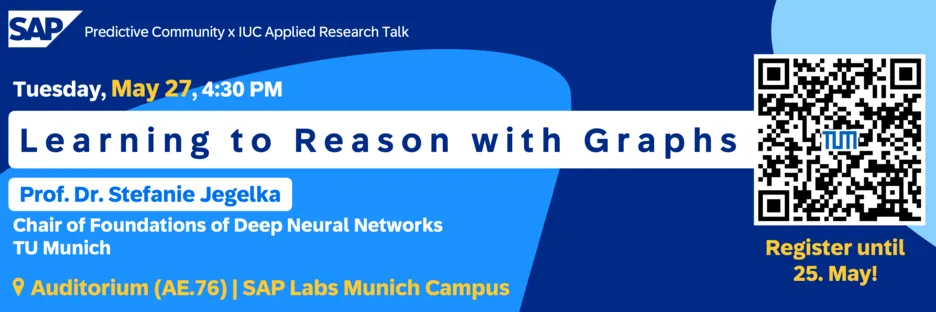Speaker: Prof. Dr. Stefanie Jegelka
Date: May 27, 2025, 4:30 - 5:30 pm
Location: SAP Labs Munich (MUE03), Friedrich-Ludwig-Bauer-Straße 5, 85748 Garching bei München, Auditorium (AE.76)
Registration: here
Abstract: Graphs are a ubiquitous data type, occurring across science, optimization, social networks, engineering, transportation, business etc. However, many questions we want to answer with graphs involve some complicated reasoning over the graph structure. One such type of example is to solve optimization problems on graphs, e.g., finding paths, partitioning, allocation, etc.
Due to the importance of such problems, there exists a large body of work on algorithms for solving graph (optimization) problems. Adding to this, recently, there has been interest in exploiting the help of neural networks in such tasks. This raises the question: to what extent can neural networks learn to do complex reasoning over graphs? Can they learn graph algorithms?
First, we will look at some considerations about the architecture when learning combinatorial optimization with (graph) neural networks. Second, while traditional methods give quality guarantees or certificates about their outputs, neural networks typically do not. Can we bridge this gap? Third, what about ubiquitous large language models? Can they do reasoning over graphs? We make some general observations about the scaling of their "chain of thought", and then about extracting their graph reasoning abilities with reinforcement learning.
Bio: Stefanie Jegelka is a Humboldt Professor at TU Munich and an Associate Professor in the Department of EECS at MIT. Before joining MIT, she was a postdoctoral researcher at UC Berkeley, and obtained her PhD from ETH Zurich and the Max Planck Institute for Intelligent Systems. Stefanie has received a Sloan Research Fellowship, an NSF CAREER Award, a DARPA Young Faculty Award, the German Pattern Recognition Award, a Best Paper Award at ICML and an invited sectional lecturer at the International Congress of Mathematicians. She has co-organized multiple workshops on (discrete) optimization in machine learning and graph representation learning, and has served as an Action Editor at JMLR and a program chair of ICML 2022.
